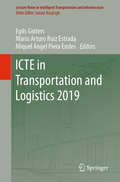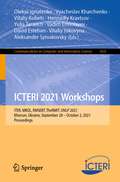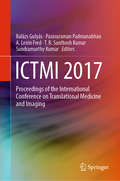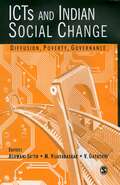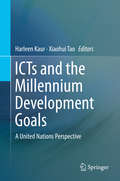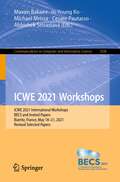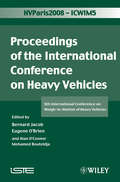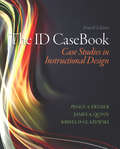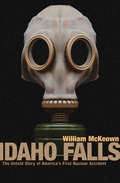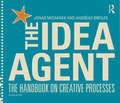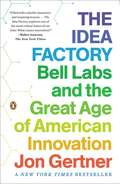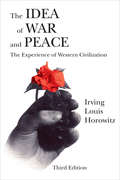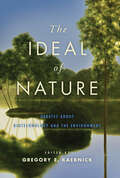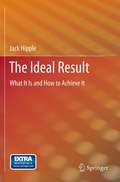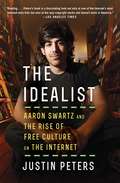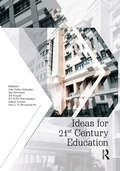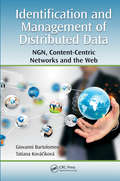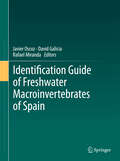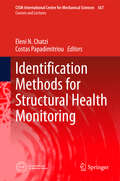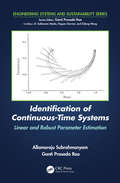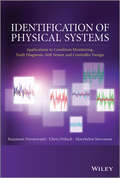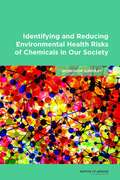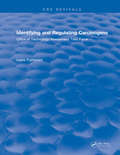- Table View
- List View
ICTE in Transportation and Logistics 2019 (Lecture Notes in Intelligent Transportation and Infrastructure)
by Egils Ginters Mario Arturo Ruiz Estrada Miquel Angel Piera ErolesThis proceedings volume explores the latest advances in transport and logistics, while also discussing the applications of modern information technologies, telecommunications, electronics, and prospective research methods and analyzing their impacts on society and the environment, which in turn determine the future development of these technologies. The book is intended for a broad readership, including transport and logistics business planners and technical experts, leveraging industry knowledge and facilitating technology adoption in promising business regions and transit corridors such as Ukraine, Kazakhstan, and others. The authors, who include policy planners and crafters as well as education and training professionals, address various types of intermodal transport such as rail, road, maritime, air, etc.
ICTERI 2021 Workshops: ITER, MROL, RMSEBT, TheRMIT, UNLP 2021, Kherson, Ukraine, September 28–October 2, 2021, Proceedings (Communications in Computer and Information Science #1635)
by Oleksii Ignatenko Vyacheslav Kharchenko Vitaliy Kobets Hennadiy Kravtsov Yulia Tarasich Vadim Ermolayev David Esteban Vitaliy Yakovyna Aleksander SpivakovskyThis book contains the workshops papers presented at the 17th International Conference on Information and Communication Technologies in Education, Research, and Industrial Applications, ICTERI 2021, held in Kherson, Ukraine, in September-October 2021. The 33 revised full papers and 4 short papers included in this volume were carefully reviewed and selected from 105 initial submissions. The papers are organized according to the following workshops: 9th International Workshop on Information Technology in Economic Research (ITER 2021); 5th International Workshop on Methods, Resources and Technologies for Open Learning and Research (MROL 2021); International Workshop RMSEBT 2021: Rigorous Methods in Software Engineering and Blockchain Technologies; 7th International Workshop on Theory of Reliability and Markov Modeling for Information Technologies (TheRMIT 2021); 1st Ukrainian Natural Language Processing Workshop (UNLP 2021).
ICTMI 2017: Proceedings of the International Conference on Translational Medicine and Imaging
by Balázs Gulyás Parasuraman Padmanabhan A. Lenin Fred T. R. Kumar Sundramurthy KumarThis book highlights the latest research presented at the International Conference on Translational Medicine and Imaging (ICTMI) 2017. This event brought together the world’s leading scientists, engineers and clinicians from a wide range of disciplines in the field of medical imaging. Bioimaging has continued to evolve across a wide spectrum of applications from diagnostics and personalized therapy to the mechanistic understanding of biological processes, and as a result there is ever-increasing demand for more robust methods and their integration with clinical and molecular data. This book presents a number of these methods.
ICTs and Indian Social Change: Diffusion, Poverty, Governance
by Ashwani Saith M. Vijayabaskar V. GayathriICTs and Indian Social Change: Diffusion, Poverty, Governance is the first book of its kind that puts together the optimistic voices of techno-idealists, critical social science perspectives on technology and a range of empirical material on the impact of Information and Communication Technologies (ICTs) on the lives of people. The book traces these processes across urban and rural spaces of work, consumption, e-governance, and highlights the new kinds of social identities they are fostering in India. It opens up an arena for dialogue between activists, technologists, policy makers and academia on using ICTs for development. The book is a logical sequel to ICTs and Indian Economic Change: Economy, Work, Regulation that addressed the implications of the growth of ICT-based sectors in India for macro-economic development and industrial efficiency. This volume views the diffusion of ICTs in India primarily in the socio cultural realm. In responding to the pioneering voices of innovators in ICTs, it provides empirical and theoretical assessments and critiques of some of the important though often latent, premises that underlie these powerful initiatives.
ICTs and the Millennium Development Goals
by Harleen Kaur Xiaohui TaoThis book attempts to create awareness about the UN-MDGs and how various ICT can be harnessed to appeal to different demographics. Current empirical evidence suggests that MDG awareness is relatively low particularly in developed countries, and that the levels of MDG awareness vary considerable across socioeconomic variables or demographics from United Nations perspective. It also examines how ICT can be used to bring about technical and social innovations strengthen livelihoods, support economic development, water and climate resilience and improve the education and health sectors and enhance development opportunities. Several studies are highlighted that reinforce the view that government support and private sector expertise and funding are important factors in ICT-based e-government solutions in developing countries. The book also builds on the thesis that a strong connection between competencies in mathematics, science, and information communication/technology is required to build logical concepts and critical thinking skills. It also examines the opportunities and barriers of promoting students' learning skills, including communication, cooperation, collaboration and connection using the Wiki tool under the blackboard platform. Finally, the book also highlights the challenges involved in application of ICT in education. This is significant for educators in order to surmount these obstacles and consequently successfully incorporate ICT into the educational system. The chapters present the relevant literature on ICTs and the perceived barriers to ICT integration in basic education. They also focus on the implications of incorporating ICT in the basic educational system. The challenges confronting the integration of ICT in education are equally identified with a view to ensuring a more efficient application of ICT in attaining education for all.
ICWE 2021 Workshops: ICWE 2021 International Workshops, BECS and Invited Papers, Biarritz, France, May 18–21, 2021, Revised Selected Papers (Communications in Computer and Information Science #1508)
by Maxim Bakaev In-Young Ko Michael Mrissa Cesare Pautasso Abhishek SrivastavaThis book constitutes the thoroughly refereed post-workshop proceedings of the 21th International Conference on Web Engineering, ICWE 2021, held in Biarritz, France, in May 2021.*The first international workshop on Big data-driven Edge Cloud Services (BECS 2021) was held to provide a venue in which scholars and practitioners can share their experiences and present on-going work on providing value-added Web services for users by utilizing big data in edge cloud environments. The 5 revised full papers and 1 revised short contribution selected from 11 submissions are presented with 2 invited papers.*The conference was held virtually due to the COVID-19 pandemic.
ICWIM 5, Proceedings of the International Conference on Heavy Vehicles: 5th International Conference on Weigh-in-Motion of Heavy Vehicles
by Bernard Jacob Eugene O’Brien Alan O’Connor Mohamed BouteldjaWeigh-in-motion (WIM) is a process of measuring the dynamic tire forces of a moving vehicle and estimating the corresponding tire loads of the static vehicle. This collection of lectures from the International Conference on Weigh-in-Motion details applications such as: collection of statistical traffic data, support of commercial vehicle enforcement, roadway and bridge cost allocation, and traffic management.
The ID CaseBook: Case Studies in Instructional Design
by Peggy A. Ertmer James A. Quinn Krista D. GlazewskiFirst Published in 2017. Routledge is an imprint of Taylor & Francis, an Informa company.The Fourth Edition of this highly regarded problem-solving text presents 30 realistic case studies in a wide range of authentic contexts, from K-12 to post-secondary, corporate, and manufacturing. The cases and their accompanying discussion questions encourage ID students to analyze the available information, develop conclusions, and consider alternative possibilities in resolving ID problems.
Idaho Falls: The Untold Story of America's First Nuclear Accident
by William McKeownThe little-known true story of a mysterious nuclear reactor disaster—years before Three Mile Island, Chernobyl, or Fukushima. Before the Three Mile Island incident or the Chernobyl disaster, the world&’s first nuclear reactor meltdown to claim lives happened on US soil. Chronicled here for the first time is the strange tale of SL-1, an experimental military reactor located in Idaho&’s Lost River Desert that exploded on the night of January 3, 1961, killing the three crewmembers on duty. Through exclusive interviews with the victims&’ families and friends, firsthand accounts from rescue workers and nuclear industry insiders, and extensive research into official documents, journalist William McKeown probes the many questions surrounding this devastating blast that have gone unanswered for decades. From reports of faulty design and mismanagement to incompetent personnel and even rumors of sabotage after a failed love affair, these plausible explanations raise startling new questions about whether the truth was deliberately suppressed to protect the nuclear energy industry.
The Idea Agent: The Handbook on Creative Processes
by Jonas Michanek Andréas BreilerThe Idea Agent is a practical idea management handbook, aimed at people who want to take an active role in creative processes across all areas. It combines the creatively wild with the rationally structured techniques for innovation to provide readers with a varied toolbox of proven idea management methodology. From discussing how to identify a problem or opportunity, to describing techniques for idea creation, it offers a step-by-step guide to building creative concepts for the marketplace. With built-in exercises and applications, this book is an ideal working companion for any innovator.
The Idea Factory: Bell Labs and the Great Age of American Innovation
by Jon GertnerBell Laboratories, which thrived from the 1920s to the 1980s, was the most innovative and productive institution of the twentieth century. Long before America's brightest scientific minds began migrating west to Silicon Valley, they flocked to this sylvan campus in the New Jersey suburbs built and funded by AT&T. At its peak, Bell Labs employed nearly fifteen thousand people, twelve hundred of whom had PhDs. Thirteen would go on to win Nobel prizes. It was a citadel of science and scholarship as well as a hotbed of creative thinking. It was, in effect, a factory of ideas whose workings have remained largely hidden until now. New York Times Magazine writer Jon Gertner unveils the unique magic of Bell Labs through the eyes and actions of its scientists. These ingenious, often eccentric men would become revolutionaries, and sometimes legends, whether for inventing radio astronomy in their spare time (and on the company's dime), riding unicycles through the corridors, or pioneering the principles that propel today's technology. In these pages, we learn how radar came to be, and lasers, transistors, satellites, mobile phones, and much more. Even more important, Gertner reveals the forces that set off this explosion of creativity. Bell Labs combined the best aspects of the academic and corporate worlds, hiring the brightest and usually the youngest minds, creating a culture and even an architecture that forced employees in different fields to work together, in virtually complete intellectual freedom, with little pressure to create moneymaking innovations. In Gertner's portrait, we come to understand why both researchers and business leaders look to Bell Labs as a model and long to incorporate its magic into their own work. Written with a novelist's gift for pacing and an ability to convey the thrill of innovation, The Idea Factory yields a revelatory take on the business of invention. What are the principles of innovation? How do new technology and new ideas begin? Are some environments more favorable than others? How should they be structured, and how should they be governed? Can strokes of genius be accelerated, replicated, standardized? The history of Bell Labs provides crucial answers that can and should be applied today by anyone who wants to understand where good ideas come from.
The Idea Machine: My Inventor's Journal
by Max Grossman Jeffrey B. FuerstMax is a boy inventor searching for his next bright idea. He keeps a journal to help him find his eureka moment. Read Max's journal to find out what he comes up with.
The Idea of War and Peace: The Experience of Western Civilization (Comparative Policy Evaluation Ser.)
by Irving HorowitzModern theorists and their ideas on war and peace are here presented, interpreted, and evaluated with scholarship and clarity of expression. In examining the main currents in modern social theory, the author has gone directly to the works of the leading philosophic figures. This book is a carefully documented analysis based on primary sources. Its republication in an expanded version after more than a half century since its initial appearance is a welcome addition to the literature on conflict and conflict resolution.In this 2007 greatly expanded third edition of The Idea of War and Peace, Irving Louis Horowitz provides a sense of substance to the character of Western Civilization. The book permits the reader to better understand what the "clash of civilizations" is about. It provides a broad outline of both European and American twentieth century social philosophies as they relate to the issue of war and peace. It also offers a new concluding section that explores in depth this same theme in the first decade of the twenty-first century.Such major figures as Bertrand Russell, John Dewey, Jacques Maritain, Albert Einstein, and Vladimir Lenin, reviewed in earlier editions, are now joined by examinations of the work of Raymond Aron, Harold D. Lasswell, and other contemporaries. The Idea of War and Peace is not just one more manual of how to conduct or avoid conflict, and even less, a guideline to policy-making. Instead, the work offers a profound sense of the theories and values that underline manuals and guides.This third edition is graced by a consideration of major figures in the second half of the twentieth century and a retrospective on the work of Niccolo Machiavelli on the nature of warfare. It also includes chapters on the relationship of war, peace, and the democratic order--and a postscript on new forms of state power and terrorism. This new edition links past and present and serves as an analytical bridge between cen
The Ideal of Nature: Debates about Biotechnology and the Environment
by Gregory E. KaebnickIn this provocative anthology, scholars consider the meaning and merits of “nature” in debates about biotechnology and the environment.Drawing on philosophy, religion, and political science, this book asks what the term “nature” means, how it should be considered, and if it is—even in part—a social construct. The contributors question if the quality of being “natural” is intrinsically valuable. They also discuss whether appeals to nature can and should affect public policy and, if so, whether they are moral trump cards or should instead be weighed against other concerns.Though consensus on these questions remains elusive, this should not be an obstacle to moving the debate forward. By bringing together disparate approaches to addressing these concepts, The Ideal of Nature suggests the possibility of intermediate positions that move beyond the usual full-throated defense and blanket dismissal found in much of the debate. Scholars of bioethics, environmental philosophy, religious studies, sociology, public policy, and political theory will find much merit in this book’s lively discussion.
The Ideal Result
by Jack HippleThe Ideal Final Result introduces the TRIZ Inventive Problem Solving Process in a way that allows readers to make immediate use of its most basic concepts. The Ideal Final Result reviews the basics of this left brained, but at the same time, very creative process for problem solving that uses a basic algorithm developed through the study of millions of patents. As opposed to psychologically based tools relying on the generation of hundreds of ideas to be sorted through to find the few of value, TRIZ rigorously defines the problem and assists the problem owner in identifying the existing inventive principles that are already known to solve that class of problems. This book reviews the most basic of the TRIZ algorithm tools and provides templates for readers to use in analyzing their difficult problems and provides a mental framework for their solution. It also describes TRIZ techniques for basic strategic planning in a business sense.
The Idealist
by Justin PetersA smart, lively history of the Internet free culture movement and its larger effects on society--and the life and shocking suicide of Aaron Swartz, a founding developer of Reddit and Creative Commons--from Slate correspondent Justin Peters.Aaron Swartz was a zealous young advocate for the free exchange of information and creative content online. He committed suicide in 2013 after being indicted by the government for illegally downloading millions of academic articles from a nonprofit online database. From the age of fifteen, when Swartz, a computer prodigy, worked with Lawrence Lessig to launch Creative Commons, to his years as a fighter for copyright reform and open information, to his work leading the protests against the Stop Online Piracy Act (SOPA), to his posthumous status as a cultural icon, Swartz's life was inextricably connected to the free culture movement. Now Justin Peters examines Swartz's life in the context of 200 years of struggle over the control of information. In vivid, accessible prose, The Idealist situates Swartz in the context of other "data moralists" past and present, from lexicographer Noah Webster to ebook pioneer Michael Hart to NSA whistleblower Edward Snowden. In the process, the book explores the history of copyright statutes and the public domain; examines archivists' ongoing quest to build the "library of the future"; and charts the rise of open access, copyleft, and other ideologies that have come to challenge protectionist IP policies. Peters also breaks down the government's case against Swartz and explains how we reached the point where federally funded academic research came to be considered private property, and downloading that material in bulk came to be considered a federal crime. The Idealist is an important investigation of the fate of the digital commons in an increasingly corporatized Internet, and an essential look at the impact of the free culture movement on our daily lives and on generations to come.
The Idealist: Aaron Swartz and the Rise of Free Culture on the Internet
by Justin PetersThis smart, “riveting” (Los Angeles Times) history of the Internet free culture movement and its larger effects on society—and the life and shocking suicide of Aaron Swartz, a founding developer of Reddit and Creative Commons—written by Slate correspondent Justin Peters “captures Swartz flawlessly” (The New York Times Book Review).Aaron Swartz was a zealous young advocate for the free exchange of information and creative content online. He committed suicide in 2013 after being indicted by the government for illegally downloading millions of academic articles from a nonprofit online database. From the age of fifteen, when Swartz, a computer prodigy, worked with Lawrence Lessig to launch Creative Commons, to his years as a fighter for copyright reform and open information, to his work leading the protests against the Stop Online Piracy Act (SOPA), to his posthumous status as a cultural icon, Swartz’s life was inextricably connected to the free culture movement. Now Justin Peters examines Swartz’s life in the context of 200 years of struggle over the control of information. In vivid, accessible prose, The Idealist situates Swartz in the context of other “data moralists” past and present, from lexicographer Noah Webster to ebook pioneer Michael Hart to NSA whistleblower Edward Snowden. In the process, the book explores the history of copyright statutes and the public domain; examines archivists’ ongoing quest to build the “library of the future”; and charts the rise of open access, the copyleft movement, and other ideologies that have come to challenge protectionist intellectual property policies. Peters also breaks down the government’s case against Swartz and explains how we reached the point where federally funded academic research came to be considered private property, and downloading that material in bulk came to be considered a federal crime. The Idealist is “an excellent survey of the intellectual property battlefield, and a sobering memorial to its most tragic victim” (The Boston Globe) and an essential look at the impact of the free culture movement on our daily lives and on generations to come.
Ideas for 21st Century Education: Proceedings of the Asian Education Symposium (AES 2016), November 22-23, 2016, Bandung, Indonesia
by Ade Gafar Abdullah Ida Hamidah Siti Aisyah Ari Arifin Danuwijaya Galuh Yuliani Heli S.H. MunawarohIdeas for 21st Century Education contains the papers presented at the Asian Education Symposium (AES 2016), held on November 22—23, 2016, in Bandung, Indonesia. The book covers 11 topics: <P><P>1. Art Education (AED)2. Adult Education (ADE)3. Business Education (BED)4. Course Management (CMT)5. Curriculum, Research and Development (CRD)6. Educational Foundations (EDF)7. Learning / Teaching Methodologies and Assessment (TMA)8. Global Issues in Education and Research (GER)9. Pedagogy (PDG)10. Ubiquitous Learning (UBL)11. Other Areas of Education (OAE)
Identification and Management of Distributed Data: NGN, Content-Centric Networks and the Web
by Giovanni Bartolomeo Tatiana KovacikovaAlthough several books and academic courses discuss data management and networking, few of them focus on the convergence of networking and software technologies for identifying, addressing, and managing distributed data. Focusing on this convergence, Identification and Management of Distributed Data: NGN, Content-Centric Networks and the Web collat
Identification Guide of Freshwater Macroinvertebrates of Spain
by David Galicia Javier Oscoz Rafael MirandaAs a result of the European Commission's concern for the status of continental waters, and as a clear reflection of the notion of water as heritage to be conserved, in the year 2000 the Water Framework Directive (2000/60/CE) was enacted, its goal being to establish a framework to protect water and the different aquatic ecosystems by requiring the Member States to achieve a good ecological status in all their waters by 2015. Like all ecosystems, freshwater ecosystems undergo physical, chemical and energy-related changes, both of natural and anthropogenic origin. These disturbances affect the organisms living in them and those who utilize their resources. Therefore, evaluating these changes has become a very important task in order to better understand aquatic systems. The study and analysis of the ecological status of these ecosystems in relation to their conservation status and water quality is thus a fundamental tool for a more efficient and rational management of their resources, that is, a management that does not threaten the ecosystem. The present guide for the identification of Spanish freshwater macroinvertebrates aims to facilitate the job of those who go to great lengths to identify them in order to then determine biotic indices. It is not the aim of this book to serve as a zoological treaty, nor does it claim to add new information on the biology or the ecology of the taxa covered. This book is, simply, a working tool explicitly designed to facilitate the identification of the Spanish macroinvertebrates and the subsequent computing of biotic indices.
Identification Methods for Structural Health Monitoring
by Eleni N. Chatzi Costas PapadimitriouThe papers in this volume provide an introduction to well known and established system identification methods for structural health monitoring and to more advanced, state-of-the-art tools, able to tackle the challenges associated with actual implementation. Starting with an overview on fundamental methods, introductory concepts are provided on the general framework of time and frequency domain, parametric and non-parametric methods, input-output or output only techniques. Cutting edge tools are introduced including, nonlinear system identification methods; Bayesian tools; and advanced modal identification techniques (such as the Kalman and particle filters, the fast Bayesian FFT method). Advanced computational tools for uncertainty quantification are discussed to provide a link between monitoring and structural integrity assessment. In addition, full scale applications and field deployments that illustrate the workings and effectiveness of the introduced monitoring schemes are demonstrated.
Identification of Continuous-Time Systems: Linear and Robust Parameter Estimation (Engineering Systems and Sustainability)
by Allamaraju Subrahmanyam Ganti Prasada RaoModels of dynamical systems are required for various purposes in the field of systems and control. The models are handled either in discrete time (DT) or in continuous time (CT). Physical systems give rise to models only in CT because they are based on physical laws which are invariably in CT. In system identification, indirect methods provide DT models which are then converted into CT. Methods of directly identifying CT models are preferred to the indirect methods for various reasons. The direct methods involve a primary stage of signal processing, followed by a secondary stage of parameter estimation. In the primary stage, the measured signals are processed by a general linear dynamic operation—computational or realized through prefilters, to preserve the system parameters in their native CT form—and the literature is rich on this aspect. In this book: Identification of Continuous-Time Systems-Linear and Robust Parameter Estimation, Allamaraju Subrahmanyam and Ganti Prasada Rao consider CT system models that are linear in their unknown parameters and propose robust methods of estimation. This book complements the existing literature on the identification of CT systems by enhancing the secondary stage through linear and robust estimation. In this book, the authors provide an overview of CT system identification, consider Markov-parameter models and time-moment models as simple linear-in-parameters models for CT system identification, bring them into mainstream model parameterization via basis functions, present a methodology to robustify the recursive least squares algorithm for parameter estimation of linear regression models, suggest a simple off-line error quantification scheme to show that it is possible to quantify error even in the absence of informative priors, and indicate some directions for further research. This modest volume is intended to be a useful addition to the literature on identifying CT systems.
Identification of Physical Systems
by Maryhelen Stevenson Rajamani Doraiswami Chris DiduchIdentification of a physical system deals with the problem of identifying its mathematical model using the measured input and output data. As the physical system is generally complex, nonlinear, and its input-output data is corrupted noise, there are fundamental theoretical and practical issues that need to be considered. Identification of Physical Systems addresses this need, presenting a systematic, unified approach to the problem of physical system identification and its practical applications. Starting with a least-squares method, the authors develop various schemes to address the issues of accuracy, variation in the operating regimes, closed loop, and interconnected subsystems. Also presented is a non-parametric signal or data-based scheme to identify a means to provide a quick macroscopic picture of the system to complement the precise microscopic picture given by the parametric model-based scheme. Finally, a sequential integration of totally different schemes, such as non-parametric, Kalman filter, and parametric model, is developed to meet the speed and accuracy requirement of mission-critical systems. Key features: Provides a clear understanding of theoretical and practical issues in identification and its applications, enabling the reader to grasp a clear understanding of the theory and apply it to practical problems Offers a self-contained guide by including the background necessary to understand this interdisciplinary subject Includes case studies for the application of identification on physical laboratory scale systems, as well as number of illustrative examples throughout the book Identification of Physical Systems is a comprehensive reference for researchers and practitioners working in this field and is also a useful source of information for graduate students in electrical, computer, biomedical, chemical, and mechanical engineering.
Identifying and Reducing Environmental Health Risks of Chemicals in Our Society: Workshop Summary
by Robert PoolOn November 7-8, 2013, the Institute of Medicine's Roundtable on Environmental Health Sciences, Research, and Medicine held a workshop to discuss approaches related to identifying and reducing potential environmental public health risks to new and existing industrial chemicals present in society. Industrial chemicals include chemicals used in industrial processes or commercial products, not including those found in food, pesticides, or pharmaceuticals. Identifying and Reducing Environmental Health Risks of Chemicals in Our Society is a summary and synthesis of the presentations and discussions that took place during the two days of the workshop. The workshop examined successes and areas for improvement within current regulatory programs for assessing industrial chemical safety, frameworks for chemical prioritization to inform targeted testing and risk management strategies, concepts of sustainability and green chemistry that support the design and use of safer alternatives, and efforts to reduce the risk of chemicals in our society.
Identifying and Regulating Carcinogens
by Lewis PublishersThis excellent resource describes the various Federal agency programs, guidelines, laws, and requirements regarding potential exposure to carcinogens in the environment-ambient air, water, and soil-workplace environment-food and drugs and other consumer products. It covers 16 different programs, activities, and Federal agencies. The reader is provided insight into the background and rationale behind current Federal Policy and regulations relating to public health and potential carcinogenic hazards. Necessary differentiation among Hazard Identification, risk characterization, risk assessment, and risk management are clearly described. This guide should prove valuable to scientists, engineers, and managers-companies, governments, universities, and consultants.
